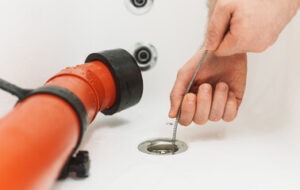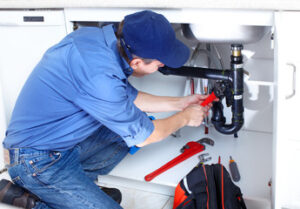A clogged drain or pipe can create a foul smell, restrict water flow and harbor bacteria that cause infections. Drain cleaners remove the buildup and prevents future blockages.

Liquid drain cleaners use a chemical reaction that generates heat or hydrochloric acid to dissolve clogs. They can damage pipes, however, and are only a temporary solution.
Chemical drain cleaners are available in liquid and gel form and contain strong acids, bases or oxidizers that travel down the pipe to reach and break up the clog. These cleaners can be dangerous to use and should only be used as directed on the label. If not handled properly, they can cause serious injury to the eyes and skin, as well as damage pipes. Most chemical drain cleaners work by generating heat to melt and disintegrate hair, grease and other organic substances that build up in the drain. They can also be harmful to the environment as they release toxic fumes that can contaminate the surrounding air.
Acidic drain cleaners typically contain high concentrations of sulfuric acid or hydrochloric acid which creates a chemical reaction with water to produce heat and dissolve the clog. These cleaners are very effective against most types of clogs including hair, grease and food waste but can be harmful to pipes because they corrode metal. They can also degrade plastic piping by releasing hydrogen chloride which weakens and disintegrates the material.
Oxidizing drain cleaners contain materials like bleach, peroxides and nitrates that oxidize organic materials in the drain clog to dissolve them. They can be very effective against a wide range of clogs including hair, grease, and paper. However, they can also be harmful to pipes because they corrode steel and copper pipes by adding aluminum ions to their chemical structure. They can also degrade PVC piping by releasing volatile organic compounds that attack and soften the material.
Liquid chemical drain cleaners should never be used with a plunger because the two products will react differently and splash violently. These chemicals are also dangerous to your health and can irritate or burn the skin, eyes and nose. Repeated exposure to these caustic chemicals can also damage your lungs and respiratory system. Using chemical drain cleaners can also be hazardous to pets and plants. After these toxic cleaners travel through your pipes and into the environment, they can poison fish and wildlife and pollute rivers, lakes and streams.
Chemical Drain Openers
Chemical drain cleaners are pure or mixed chemicals designed to dissolve organic blockages in drain pipes such as hair, food scraps, and paper products. They are often combined with mechanical drain cleaning devices like snakes or flange plungers for the best results. They are available in liquid, powder, and tablet forms and may be sold in hardware stores or big box retailers.
Most chemical cleaners work by creating a reaction with caustic substances that create heat and melt through the clog material. These reactions can be dangerous, especially if the chemical comes in contact with your skin or eyes. They can also be toxic if inhaled and can lead to chemical burns, irritated or watery eyes, or even respiratory distress and shock.
These strong chemicals can also be dangerous if they seep into the ground or surface water. They can poison plants and animals that come into contact with them, and if they get into drinking water supplies, they can cause illness or even death in people. The best way to protect yourself when using chemical drain openers is to wear proper PPE, such as rubber gloves that extend up past the wrist and a face mask or respirator. You should also open and pour chemical drain cleaners well away from your body and in a well-ventilated area.
Another risk associated with chemical drain cleaners is damage to the plumbing pipes. Some chemical drain cleaners contain acids that can corrode metal plumbing pipes, causing leaks and cracks. They can also react with other household items, such as aluminum foil and paints, to create toxic fumes that can irritate the nose, eyes, and throat.
If you find yourself faced with a serious drain clog, there are several safe and effective alternatives to chemical drain cleaners. One simple method is to use hot and cold water to break up the clog. You can also try a mixture of baking soda and vinegar, which works in much the same way as commercial chemical drain cleaners but is safer and more affordable. To make this solution, first clear out any standing water in the drain with hot water. Then, pour down half a cup of baking soda followed by the same amount of white vinegar. Wait for the chemical reaction to take place, then flush the drain with cold water.
Natural Drain Cleaners
Most household cleaners contain caustic chemicals that can damage pipes. However, with some simple ingredients and a little patience, you can create an all-natural drain cleaner that will keep your drains flowing smoothly and prevent future clogs.
Baking soda is one of the most common natural drain cleaners. It can break down grease and oils that have accumulated in the pipes, as well as eliminate odors. Simply pour a cup of baking soda down the drain, followed by a cup of vinegar. The vinegar will cause the baking soda to foam, providing some agitation that can help clear even stubborn clogs. Once the mixture has had time to work, flush it with boiling water.
Another effective homemade drain cleaner is a combination of borax, salt, and baking soda. This natural mixture is safe for most plumbing systems, including PVC pipes. Pour two cups of baking soda down the drain, followed by one cup of borax, and then finally salt. Allow the solution to sit for an hour, then flush it with hot water.
A few tablespoons of dishwashing detergent mixed with lukewarm water can also help remove food scraps, hair, and other organic materials that can clog pipes. The soap breaks down grease and grime, while the lukewarm water helps flush it away from the pipes. For best results, this natural drain cleaner should be used routinely to prevent clogs.
Vinegar can be an effective natural drain unclogger, but it is best used on its own rather than in conjunction with other chemical cleaners. When combined with other chemicals, it can create noxious fumes that are harmful to the environment and to your health.
If you are not comfortable using vinegar or baking soda, try a degreasing drain cleaner made from two tablespoons of liquid dishwashing detergent and a cup of boiling water. The dishwashing detergent will break down fats and oils, while the boiling water will flush them from the pipes. This drain cleaner is especially helpful for kitchen drains that often get clogged with grease. If these DIY options don’t work, consider using a wire coat hanger to manually remove the clog.
DIY Drain Cleaners
Sink drains often fly under the radar when it comes to routine cleaning, but clogs can be a huge hassle and a hazard to your health. Regularly cleaning your drains with natural homemade cleaners can prevent these problems and keep them running efficiently. These DIY cleaners are easy to make and cost-effective, and they’re also better for the environment than chemical drain openers.
Many commercial drain cleaners are formulated with sodium hydroxide and sulfuric acid, which can cause damage to your pipes over time. They also release harsh fumes that can irritate your nose, eyes, and lungs. Natural DIY drain cleaners use common household items and are safer to use around kids and pets.
One of the most common DIY drain cleaner recipes uses baking soda, vinegar, and hot water to break down clogs and clean your pipes. The key is to start with a large pot of hot (but not boiling) water and pour it down the drain. This will melt any grease and food scraps that may be stuck inside your pipes.
Next, pour in a cup of baking soda and half a cup of vinegar. The vinegar will help to dissolve any remaining clogs and the baking soda will act as a neutralizer, eliminating any unpleasant smells. Leave the solution in your drain for about an hour and then flush it with a pot of hot water. Repeat this process as needed to keep your drains looking and smelling their best.
Another simple DIY drain cleaner recipe involves just two ingredients: baking soda and table salt. Mix equal parts of each into a jar and shake well to combine them. Then, pour the mixture down your drain and follow with a cup of hot water. This solution should break down any greasy build-up in your drains and prevent future clogs.
While these DIY cleaners can be more effective than liquid drain cleaners, they do tend to take longer to work and aren’t as quick to clear a blocked drain. In addition, they’re not as readily available in stores, and they can be difficult to find in bulk. If you need a faster, more reliable option, consider investing in an electric drain snake.

